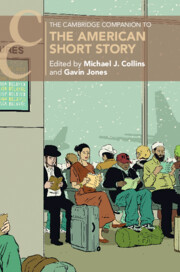Book contents
- The Cambridge Companion to the American Short Story
- The Cambridge Companion to the American Short Story
- Copyright page
- Contents
- Figures
- Tables
- Contributors
- Chronology
- Introduction
- Part I Contexts
- Chapter 1 Transatlantic Print Culture and the Emergence of Short Narratives
- Chapter 2 The Short Story and the Early Magazine
- Chapter 3 The Short Story Fad
- Chapter 4 The Best of the Best
- Chapter 5 The Story of a Semester
- Chapter 6 The Short Story in the Age of the Internet
- Part II Histories
- Part III People and Places
- Part IV Theories
- Notes
- Further Reading
- Index
- Cambridge Companions to…
- References
Chapter 2 - The Short Story and the Early Magazine
from Part I - Contexts
Published online by Cambridge University Press: 11 May 2023
- The Cambridge Companion to the American Short Story
- The Cambridge Companion to the American Short Story
- Copyright page
- Contents
- Figures
- Tables
- Contributors
- Chronology
- Introduction
- Part I Contexts
- Chapter 1 Transatlantic Print Culture and the Emergence of Short Narratives
- Chapter 2 The Short Story and the Early Magazine
- Chapter 3 The Short Story Fad
- Chapter 4 The Best of the Best
- Chapter 5 The Story of a Semester
- Chapter 6 The Short Story in the Age of the Internet
- Part II Histories
- Part III People and Places
- Part IV Theories
- Notes
- Further Reading
- Index
- Cambridge Companions to…
- References
Summary
This chapter explores the magazine culture of late colonial and early national America in order to recover the crucial role played by the short story in the periodical’s overburdened ambition to bring “cultural capital” across the Atlantic. Looking at these magazines we find the short story in unlikely places and forms – embedded within other fictions or non-fiction narratives, serialized in relationship to prized illustrations, or disguised as the “serial essay.” But while the print economy of the magazine would change dramatically by the 1840s and 1850s, resulting in the rise of the more familiar and recognizable periodical short story, the magazine short story has been there virtually from the beginning.
- Type
- Chapter
- Information
- The Cambridge Companion to the American Short Story , pp. 31 - 45Publisher: Cambridge University PressPrint publication year: 2023



